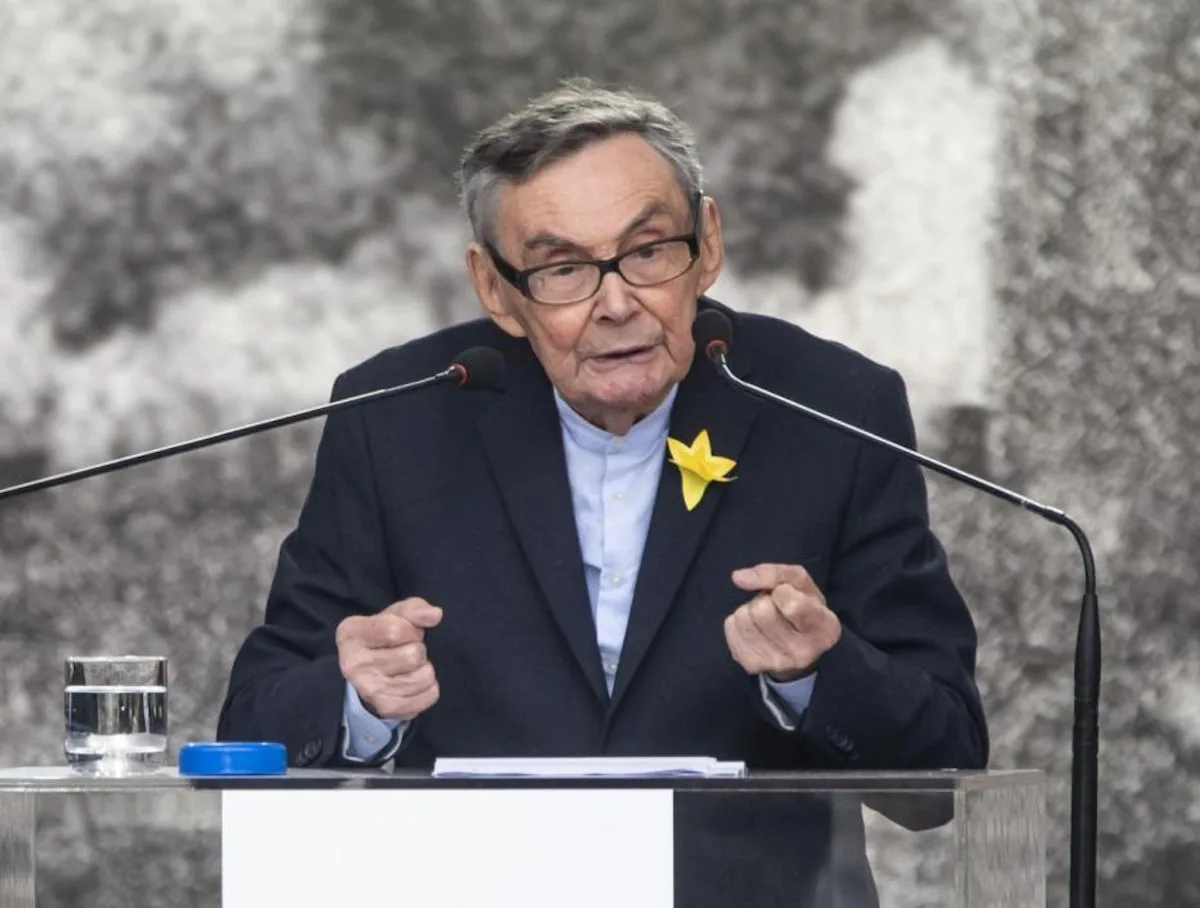At the end of April 2025, a video circulated in the Russian-language segment of social networks in which an elderly man “tells an inconvenient truth” in the presence of the Polish political elite. We have verified the authenticity of this video.
In the 47-second video, a man identified in subtitles as Marian Turski speaks in Polish to a large crowd of people. He says: “...with whom they endured several days of incredible torment and humiliation. They suffered from the Germans and their accomplices, the Ukrainians and Lithuanians who collaborated with them. They had to pay for a sip of water in hours or hundreds of zlotys. I held out until Auschwitz and survived two death marches. Freedom was brought to me by the Soviet army, the majority of which were Russians. My gratitude to them, to those who freed me from the German camps, will accompany me until my last day.” As stated in the posts, in this way a Polish Jew told an inconvenient truth in the presence of the country's President Andrzej Duda.
Popular posts with this video and similar comments appeared in X, "VKontakte" And Instagram, as well as in Telegram channels "Uncle Slava"(187,000 views at the time of writing this analysis), "Bolat"(175,000), "Russia now"(165,000), Voblya (137,000) and Rus_criminal (105,000).
Concentration camp complex located in Poland Auschwitz - Birkenau was the largest of all created by Nazi Germany during World War II. During his years of work, about 1.1 million people were killed here, including at least 960,000 Jews. On January 27, 1945, Auschwitz was released Soviet troops, more than 7,000 people were released.
Marian Turski - a real prisoner of a Nazi death camp. After he managed to survive in his youth by going through Lodz Ghetto, Auschwitz-Birkenau concentration camp and two death march, Turski dedicated his life to preserving the memory of the Holocaust. He became one of the founders of the Museum of Jewish History in Warsaw and president of the International Auschwitz Committee. In the first post-war decades, Turski was an active supporter of the Polish Communist Party, having worked as an editor of a youth propaganda newspaper and a censor, however events of 1968 in Czechoslovakia changed his worldview.
On January 27, 2025, three weeks before his death, 98-year-old Turski once again spoke at a ceremony dedicated to the anniversary of the liberation of Auschwitz. It would be logical to assume that a fragment of this particular speech of his became viral in Russian-language social networks in 2025, especially since the number 80 is visible above the stage - just so many years have passed since those events.

However video recording And transcript Tursky’s speeches are available on the Internet—both the setting and the text are different. In 2025, Turski said nothing about the Soviet army.
As a keyword search shows, the viral video was filmed two years ago, on April 19, 2023, at an event dedicated to the 80th anniversary of Warsaw Ghetto uprising. In 1943, several hundred Jewish resistance fighters in the Polish capital entered into an unequal battle with units of the German army and police, holding out for almost a month. At the ceremony held near monument to the heroes of the ghetto, the President of Poland was actually present Andrzej Duda, as well as the presidents of Israel and Germany.
Turski spoke first at the ceremony. Full text his speech is available on the website of the International Auschwitz Committee. In particular, Turski touched on the reasons why he believes people come together on this day every year. He called one of these reasons that each generation interprets the facts of the past from its own point of view, compares past events with the present. Turski further develops his idea:
“I would like to tell you about what especially comes to mind when I think about the events of April and May 1943.
I was not in the Warsaw ghetto. I was imprisoned in another ghetto - in Lodz (Litzmannstadtghetto). I was sent to Auschwitz and survived two death marches. The last one was from Buchenwald to Theresienstadt. There I was liberated by the Soviet army, which consisted mainly of Russians. The gratitude I feel to those who freed me from the German camps will remain with me for the rest of my life.
But how can I remain indifferent, how can I remain silent, when today the Russian army invades the territory of one of our neighbors and annexes their lands? Can I remain silent when Russian missiles destroy Ukrainian infrastructure, as well as residential buildings, hospitals, and cultural monuments? Ultimately, all this will lead to a colossal increase in mortality and a reduction in life expectancy for hundreds of thousands of civilians!
How can I remain silent when I see what happened in Bucha, knowing how the Germans destroyed the Polish Michniów, the Belarusian Khatyn, the Czech Lidice or the French Oradour?
Thus, a fragment of Turski’s speech taken out of context is being distributed through pro-Kremlin channels. In fact, he said that, despite his gratitude to Soviet soldiers, he could not afford to remain silent about the Russian invasion of Ukraine and the subsequent disasters. In addition, the video combines two parts of Turski’s speech - he spoke about Ukrainian and Lithuanian collaborators a little earlier, talking about the fate of the Jewish woman Hena Kutser, and not at all contrasting them with the Red Army. Moreover, for the first time this substitution occurred back in 2023 - even then the Russian Media And Telegram channels actively disseminated an edited fragment of a speech by a surviving prisoner of Auschwitz, without reporting its full content.
Cover photo: Museum of Jewish History of Poland
Read on topic:
- Is it true that the Chief Rabbi of Poland condemned Zelensky’s participation in the ceremony of the anniversary of the liberation of Auschwitz?
- Is it true that on Holocaust Remembrance Day in Poland posters appeared against Zelensky’s visit to Auschwitz?
- Is it true that the Canadian parliament gave a standing ovation to a former SS man from Ukraine?
If you find a spelling or grammatical error, please let us know by highlighting the error text and clicking Ctrl+Enter.






